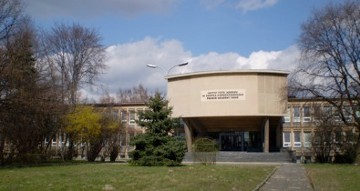

This report covers a variety of topics and pictures, such as,
his research, the Institute, lifestyle in Poland, and more!
Enjoy his lively report!
I have been at the Institute of Nuclear Physics in Kraków, Poland for the collaboration since February 24, 2008. This visit is supported by the JSPS International Training Program (ITP). I am staying here for two months altogether. Now the first month has passed. Here I report my stay in this month.
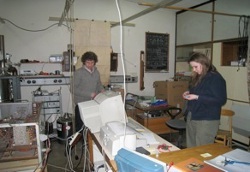 Our laboratory. The two persons are my coworkers.
Our laboratory. The two persons are my coworkers.
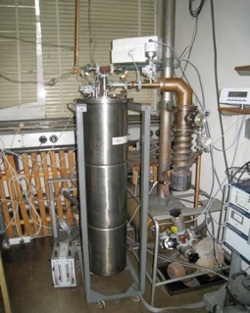
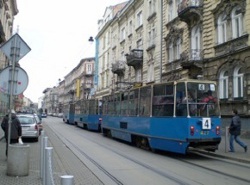
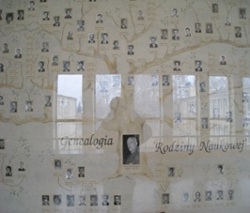

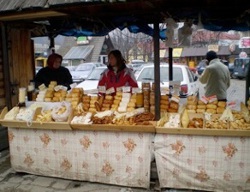
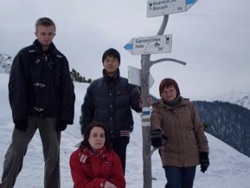
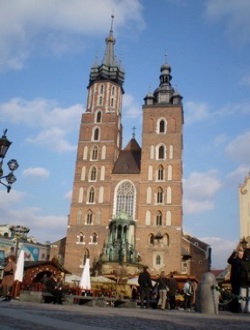
The host group (Department of Structure Research of Condensed Matter) and my research group at Osaka (Research Center for Molecular Thermodynamics) have a long history for collaboration. This collaboration is also formally accepted as the Scientific and Technological Cooperation Joint Project supported by both Polish and Japanese governments. I have engaged in some of the collaborations, in particular the studies of thermodynamic properties and molecular dynamics of chiral cyanobiphenyl compounds. The main purpose of this stay is to discuss all the results obtained till now and to prepare the manuscript.
The formal name of the institute is The Henryk Niewodniczański Institute of Nuclear Physics, Polish Academy of Sciences. It consists of five divisions and each division consists of several departments. I belong to Department of Structure Research of Condensed Matter (NZ31) in the Division of Condensed Matter Physics (NO3). There ...are 20 staffs and 9 Ph.D. students in this department. The research activity ranges from soft molecular matter (molecular glasses, liquid crystals, polymers) through molecular magnets to metal oxides and intermetallics.
We discussed the calorimetric results of (S)-4-(2-methylbutyl)-4′-cyanobiphenyl (5*CB) obtained at Osaka and prepared a paper this month. We have just submitted the article to a Journal. 5*CB is a substance of chiral molecule and its non-chiral isomer is well known liquid crystalline material 4-pentyl-4′-cyanobiphenyl (5CB). The phase behavior of 5*CB is complicated and entirely different from that of 5CB. This is a good example which shows a significant effect of chiral modification on the phase behavior. In the paper, we confirmed the phase relation as well as the thermodynamic functions for all phases of 5*CB. We are now writing up two more papers on other measurements for 5*CB and its analogous compounds. We also launched another joint study of a material which has multi-plastic crystalline phases. Now we are measuring the heat capacity of the material by adiabatic calorimetry.
Generally people start working before 9:00 in the morning and finish around 16:00. Since I usually start working around 10:00 and finish after 20:00 in Japan, the life style here surprised me at first time. Later I came to know that they work at home. They go home earlier to take care of their family.
We have a seminar of the department every Tuesday. Usually the seminar is given in Polish but while my stay, they kindly change their convention and give it in English. There are lively discussions during and after the presentation. I learned much from the seminar. This is one of my favorite hours in a week. On Wednesday morning we have a “tea time”. All the members of the department get together and discuss various things including the schedule in the week with a cup of tea and cookies. On Thursday there is the Institute Seminar at big lecture room. We can hear the presentations of other divisions such as nuclear physics or high-energy astrophysics. Unfortunately the lectures are given in Polish. I attended this seminar only once. In addition to these seminars, we can attend any seminars of other groups. This open system was impressive for me. I am going to give my presentation on April 15 in the seminar of my department.
There is a canteen in the Institute and I usually take lunch there. Generally Polish people take a big lunch, so it should be called dinner. Many of the researchers do not take dinner at the Institute but take it at home after they go home. This is one of the reasons they go home earlier. The dishes in canteen are tasty, especially soups are nice. There are various kinds of soup in Poland. One of the typical Polish dishes, Pierogi, is also available in the canteen. It looks like jiao-zi (or Gyoza) in Japan. I also found a dish named “Kotlet schabowy”. It is a relative of “Katsu” in Japan. The taste is also similar to ours. Since the canteen closes at 15:00, I prepare myself the supper. The shopping in the supermarket is interesting. Sometimes people in the supermarket do not speak English then we have to communicate through body language. Various kinds of ham and cheese are sold in the supermarket and it is also one of my pleasures to try many variations. They taste good.
Now in the middle of March, the temperature is between 0 and 10 °C. It still sometimes snows but trees come into bud. People say that the landscape will dramatically change in a month. I am looking forward to seeing it. Although the temperature now is as usual, it was abnormally warm in this winter in Poland. Actually when I arrived here, the temperature was even higher than at Osaka. This tendency was started a few years ago.
One of the facts impressed me is that there are many woman researchers in the institute. The number of the woman researcher here may be about 30 ~ 40%. Compared to the situation in Japan, this number is amazing. Someone says that this may be due to the difference of the educational system of two countries. Other person says that this may be because the position of researcher is suited for women with children because the working hours are more flexible than that of the private companies. I am not sure which is true.
I am grateful for the hospitality here. People in this institute, including students, are really kind to me. They always take care of me. As represented in the seminar in English, everyone tries to let me be “inside” the group. I often hear that the foreign people in Japan feel lonely. What is the difference? This is not the problem of the skill for conversation in English. Actually the English-language ability of Polish researchers or students seems more or less same level to that of Japanese. The reason, I think, is that people in Poland do not hesitate when they make communication. We sometimes have a small trouble with communication but they never stop trying to make it. In addition I think Polish people are generally true well-wishers. I have learned a lot from their way of thinking.